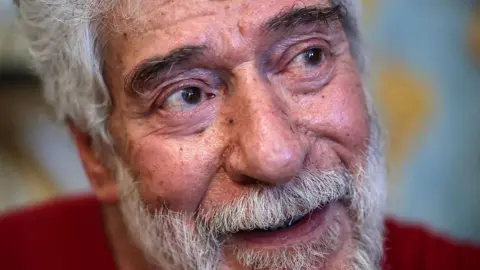### Pro-Palestinian Convict Freed by France After 41 Years
In a significant development, Georges Abdallah, a 74-year-old Lebanese national, has been released from prison in France after serving 41 years. Abdallah is a prominent figure within left-wing circles and has become a symbol of the Palestinian cause. His release took place in the early hours of Friday, following a lengthy imprisonment that began in 1984 after he was found guilty of involvement in the murders of two diplomats—one American and one Israeli—in France.
Abdallah’s case garnered attention not only for its political implications but also for its timing. His conviction, which occurred in 1987, was widely viewed as part of the complex interplay between France, Israel, and the Palestinian struggle. His lawyer described him as “the man who has spent the longest time in prison” in connection with events surrounding the Israeli-Palestinian conflict. Following his release, he was slated to board a flight directly to Beirut, illustrating the cross-border implications of his long-standing imprisonment.
His past is deeply interwoven with the history of conflict in the Middle East. Abdallah had gradually faded from public consciousness over the decades; however, he remained a rallying point for activists in particular Marxist-Leninist factions who identified with his political beliefs. Annually, protests were held outside his prison to demand his release, showcasing a continual presence of his support network, despite the dilution of his public image over time.
### Background on Abdallah’s Conviction
Abdallah was involved with the Lebanese Armed Revolutionary Factions (LARF), a small revolutionary group formed in the late 1970s amid Lebanon’s civil war. As part of LARF, he participated in targeting Israeli and U.S. interests in Europe. The conflict in Lebanon saw Israeli incursions in both 1978 and 1982, spurring various factions, including Abdallah’s, to retaliate against their adversaries through violent means. The attacks orchestrated by LARF included the killing of U.S. diplomat Charles Ray and Israeli diplomat Yakov Barsimantov, alongside other incidents.
Arrested in Lyon in 1984, Abdallah initially faced minor charges before being implicated in the more serious crime of murder following the discovery of weapons in his possession, including the firearm linked to the diplomats’ deaths. His trial was marked by a series of dramatic turns, including public and political pressures that influenced the proceedings and perceptions of justice.
### The Long Road to Freedom
Despite being eligible for parole since 1999, Abdallah’s requests for release were repeatedly denied. His advocates have claimed that these denials were influenced by external pressures, particularly from the United States and Israel. Throughout his incarceration, Abdallah maintained his dedication to the Palestinian cause, often stating that it helped him preserve his mental wellbeing during the long years behind bars. He decorated his prison cell with revolutionary imagery and maintained correspondence with supporters globally, further solidifying his status as a figure of resistance.
Human rights advocates, including notable figures outside of his immediate supporter group, have condemned the prolonged nature of Abdallah’s imprisonment. Critics have pointed to potential miscarriages of justice influenced by international politics, especially citing the involvement of the U.S. government in the negotiations regarding his potential release. The most significant political intervention occurred in 2013 when then-Secretary of State Hillary Clinton expressed hope to French officials that they could contest a court ruling favoring Abdallah’s release.
This year, a French appeals court determined that Abdallah’s detention was “disproportionate” given the time he had already served without any new threat to society, resulting in his eventual release.
### Conclusion
The narrative surrounding Georges Abdallah sheds light not only on the personal ramifications of political actions and struggles but also highlights the complex realities of international relations, particularly concerning the Israeli-Palestinian conflict. His case intertwines issues of justice, political rebellion, and personal conviction, provoking discussions about the nature of imprisonment and the essence of political struggle. His release has been framed as both a victory for justice and a stark reminder of the political undercurrents that shape individual lives, particularly in the context of protracted conflicts like those in the Middle East.












